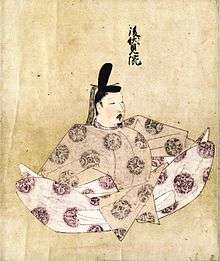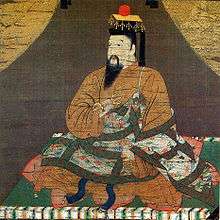1288
Year 1288 (MCCLXXXVIII) was a leap year starting on Thursday (link will display the full calendar) of the Julian calendar.
| Millennium: | 2nd millennium |
|---|---|
| Centuries: | |
| Decades: | |
| Years: |
| 1288 by topic |
|---|
| Leaders |
|
| Birth and death categories |
| Births – Deaths |
| Establishments and disestablishments categories |
| Establishments – Disestablishments |
| Art and literature |
| 1288 in poetry |
| Gregorian calendar | 1288 MCCLXXXVIII |
| Ab urbe condita | 2041 |
| Armenian calendar | 737 ԹՎ ՉԼԷ |
| Assyrian calendar | 6038 |
| Balinese saka calendar | 1209–1210 |
| Bengali calendar | 695 |
| Berber calendar | 2238 |
| English Regnal year | 16 Edw. 1 – 17 Edw. 1 |
| Buddhist calendar | 1832 |
| Burmese calendar | 650 |
| Byzantine calendar | 6796–6797 |
| Chinese calendar | 丁亥年 (Fire Pig) 3984 or 3924 — to — 戊子年 (Earth Rat) 3985 or 3925 |
| Coptic calendar | 1004–1005 |
| Discordian calendar | 2454 |
| Ethiopian calendar | 1280–1281 |
| Hebrew calendar | 5048–5049 |
| Hindu calendars | |
| - Vikram Samvat | 1344–1345 |
| - Shaka Samvat | 1209–1210 |
| - Kali Yuga | 4388–4389 |
| Holocene calendar | 11288 |
| Igbo calendar | 288–289 |
| Iranian calendar | 666–667 |
| Islamic calendar | 686–687 |
| Japanese calendar | Kōan 11 / Shōō 1 (正応元年) |
| Javanese calendar | 1198–1199 |
| Julian calendar | 1288 MCCLXXXVIII |
| Korean calendar | 3621 |
| Minguo calendar | 624 before ROC 民前624年 |
| Nanakshahi calendar | −180 |
| Thai solar calendar | 1830–1831 |
| Tibetan calendar | 阴火猪年 (female Fire-Pig) 1414 or 1033 or 261 — to — 阳土鼠年 (male Earth-Rat) 1415 or 1034 or 262 |
| Wikimedia Commons has media related to 1288. |
Events
By area
Asia
- April – Battle of Bạch Đằng: Đại Việt (Vietnamese) general Trần Hưng Đạo sinks the fleet of an invading Mongol army of the Yuan Dynasty, by placing steel-tipped bamboo stakes in the Bach Dang River near Ha Long Bay.
- The Japanese era Koan ends, and the Shōō era begins.
- Japan: Prince Subaru conquers the provinces of Gunma and Tochigi.
- Li Ting leads troops and portable cannon of Kublai Khan against the rebel prince Nayan, at Banlachengzi in Manchuria.[1]
Europe
- January 20 – Newcastle Emlyn Castle in Wales is recaptured by English forces, bringing Rhys ap Maredudd's revolt to an end.
- June 5 – Battle of Worringen: John I of Brabant defeats the duchy of Guelders in one of the largest battles in Europe of the Middle Ages, thus winning possession of the Duchy of Limburg. The battle also liberates the city of Cologne from rule by the Archbishopric of Cologne; it had previously been one of the major ecclesiastical principalities of the Holy Roman Empire.
- August 8 – Pope Nicholas IV proclaims a crusade against King Ladislaus IV of Hungary, who had lost credibility by favoring his semi-pagan Cuman subjects, and in general refusing to conform to the social standards of western Europe.
- The Scots Parliament creates a law allowing women to propose marriage to men during leap years; men who refuse such proposals are required to pay a fine to the spurned bride-to-be.
By topic
Arts and culture
- The oldest surviving bell, in the clocks atop the dome of St. Peter's Basilica in Rome, is built.
- Work is begun on the construction of Mob Quad in Merton College, Oxford.
Markets
Religion
- February 22 – Pope Nicholas IV succeeds Pope Honorius IV, as the 191st pope.
Technology
- The oldest known bronze handgun in the world is dated to this year, a Chinese gun found in Acheng District, that was once used to suppress the rebellion of the Christian Mongol Prince Nayan in 1287–1288.
Births
- April 5 – Emperor Go-Fushimi of Japan (d. 1336)
- November 26 – Emperor Go-Daigo of Japan (d. 1339)
- Blanche of Burgundy, Countess of Savoy (d. 1348)
- Gersonides, French Jewish philosopher, mathematician, and astronomer (d. 1344)
- Ivan I of Russia (d. 1340)
Deaths
- April 24 – Gertrude of Austria, duchess and claimant (b. 1226)
- July 3 – Stephen de Fulbourn, Irish cleric and politician
- September 30 – Leszek II the Black, Polish prince, Duke of Łęczyca, Sieradz, Kraków, Sandomierz (b. 1241)
- November 19 – Rudolf I, Margrave of Baden-Baden (b. 1230)
- date unknown
- Ibn Nafis, Syrian Arabic anatomist, discoverer of the circulation of the blood (b. 1210)
- Guy de Montfort, Count of Nola (approximate date; b. 1244)
gollark: Your name is ACTUALLY Matt?
gollark: I refuse to search through 3 kilomessages for this.
gollark: Sure. How is this done?
gollark: Yes, gaming can occur.
gollark: No.
References
- History of Yuan.
- Munro, John H. (2003). "The Medieval Origins of the Financial Revolution". The International History Review. 15 (3): 506–562.
This article is issued from Wikipedia. The text is licensed under Creative Commons - Attribution - Sharealike. Additional terms may apply for the media files.

